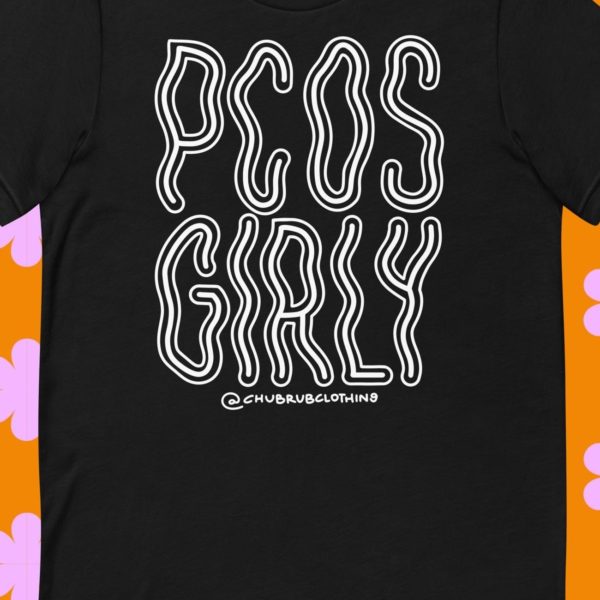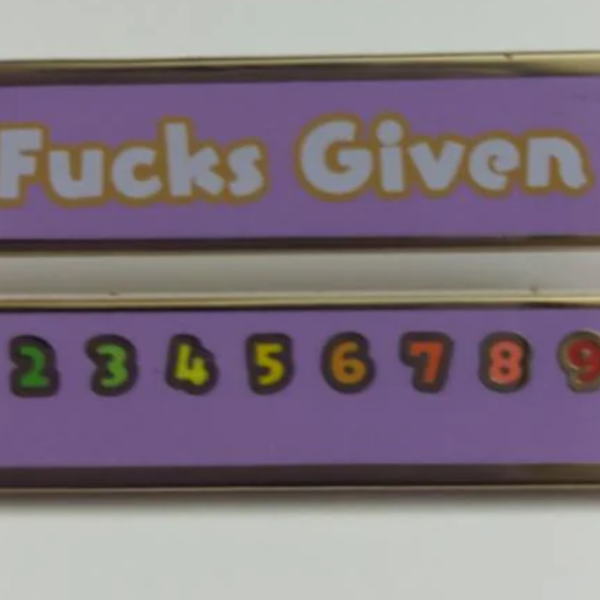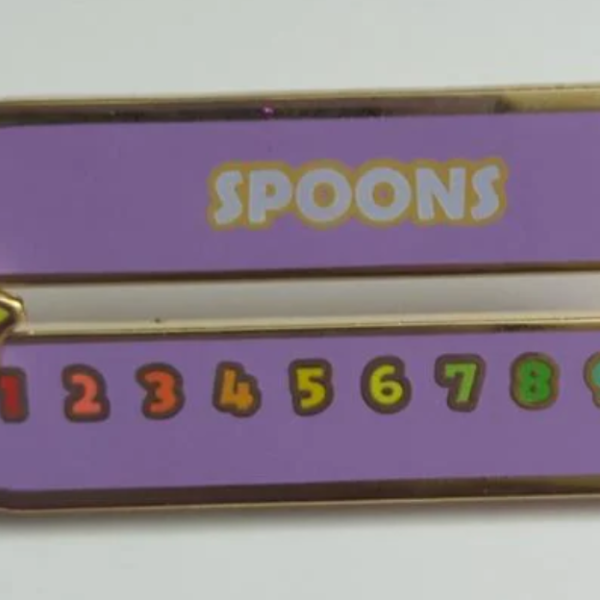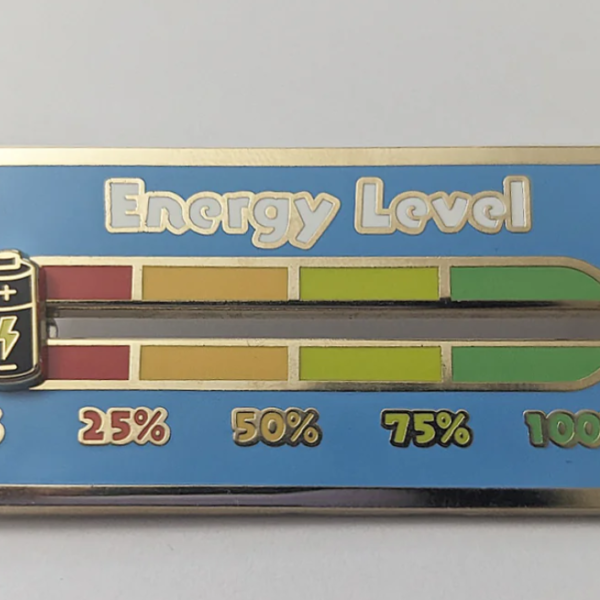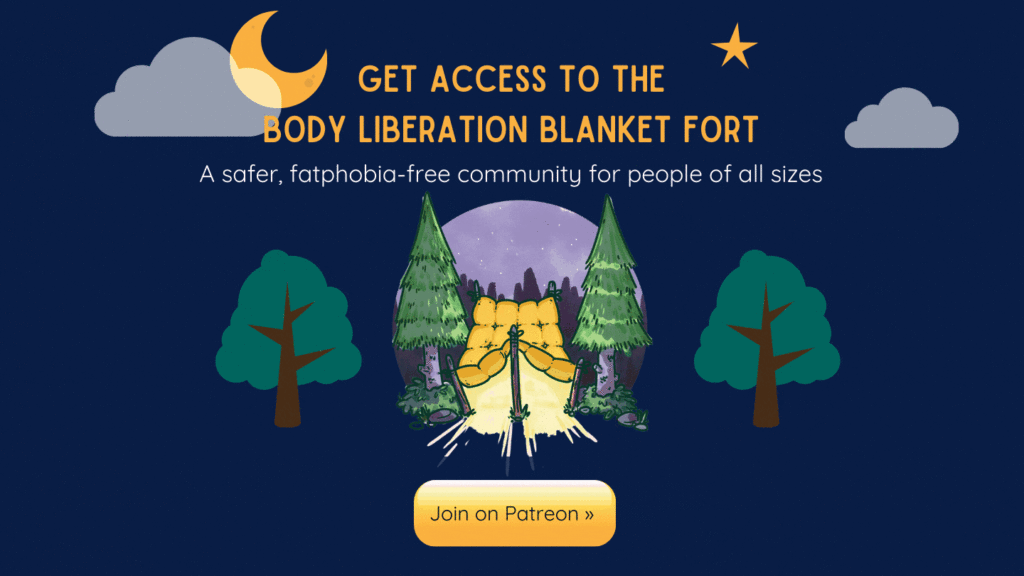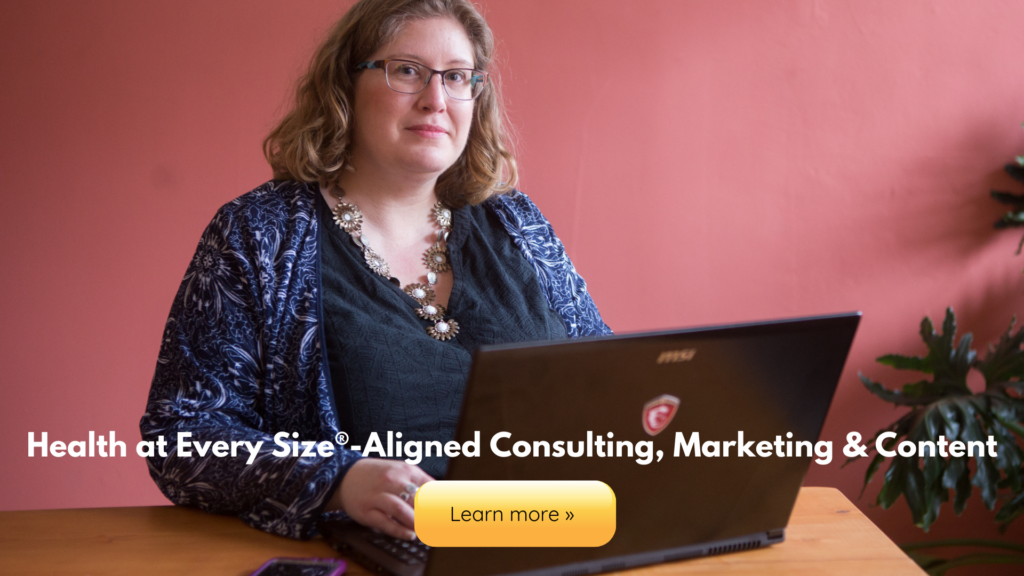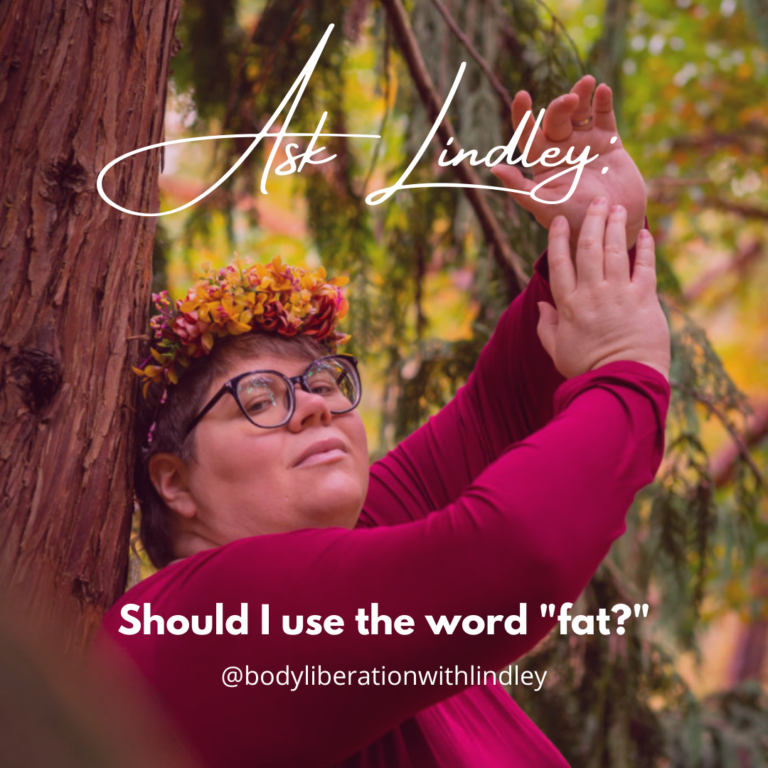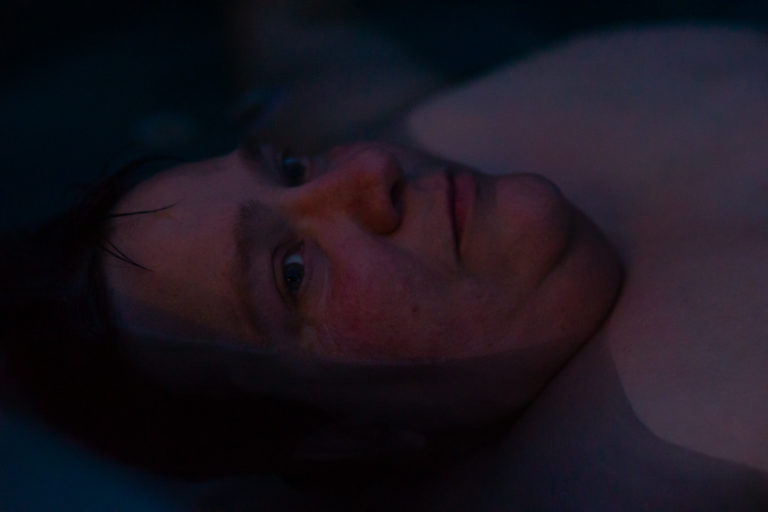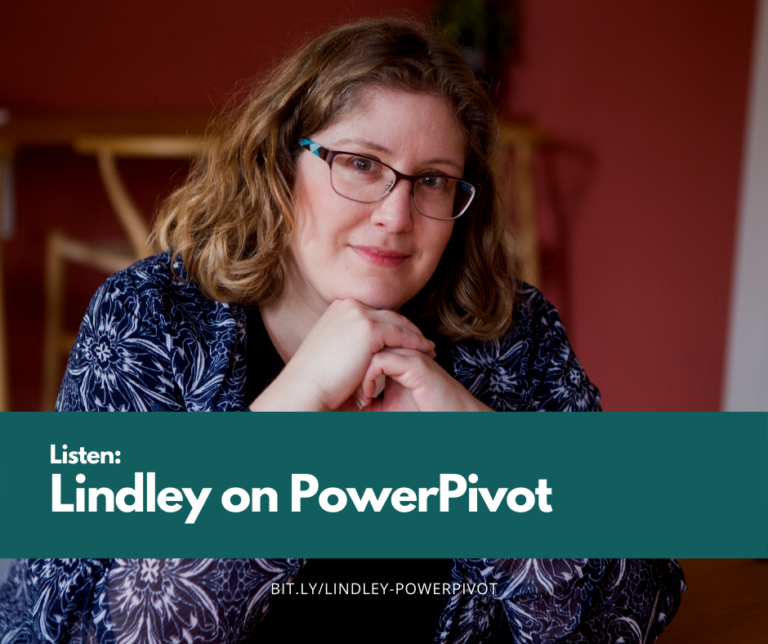Listen: Lindley on Radiant Woman with Tarisha Tourok: Getting off the hook, fatphobia and choosing the right partner for your body type
Tarisha & Lindley discuss the myth that “loving your body is fine, but that can’t be healthy“.
Women are afraid that if they love their body, they’ll let themselves off the hook and will stop taking care of themselves. Listen to what we have to say about the idea that we have to judge ourselves and punish ourselves in order to stay healthy.
They also talk about beauty standards and inner radiance.
Plus, what to do if your partner doesn’t like your body…
Episode Transcript
[00:00:00] Lindley Ashline: It’s really hard to focus on your partner when all you can think about is your belly and or whether your boobs are flopping around in a weird way or whatever you were with someone who is not genuinely excited about you taking your clothes off, that person is not a good fit for you.
[00:00:28] That person is not a good fit for you, if they are not delighted by your body. And I don’t mean puts up with your body or isn’t offended by your boss, you know, if they’re not weakened delighted, you deserve better than that.
[00:00:46] Welcome to the radiant woman podcast, where women learn how to become radiant, confident, and own the power of their sexuality. No matter their size, shape, age, or [00:01:00] race, your host is Theresha to rock. Visit our website at www dot radiant woman dot C O dot Enzyte to join the radiant women movement.
[00:01:14] Tarisha Tourok: So, yeah, welcome Lindley.
[00:01:15] It’s so nice to welcome you to my new podcast. And I admired very much for celebrating the beauty of borders that really, you know, we don’t talk about, you know, the bigger borders and how you talk about the foot phobia. And I really admire how you use the word fat in such a. It’s just effect rather than a negative quality of someone.
[00:01:41] And I think it’s, it’s such a strong stand and yeah. So I really welcome you here today.
[00:01:47] Lindley Ashline: Oh, thank you. This is such joyful work to do, and it’s, it’s so much fun to talk about and yeah, yeah. I do use the word fat to describe bodies like mine I’m in a very large body [00:02:00] and that doesn’t mean that anyone. Is, you know, needs to use that for themselves or for other people, but there are a lot of us who were in these bigger bodies who have reclaimed that term and we’re using it as just a neutral term.
[00:02:13] Like I might say I currently have pink hair and I’m wearing a black sweater and I am medium. And I am in a fat body. All of those are neutral terms. So I’m using fat. You’ll hear me use it quite a bit just to, to describe bodies like mine.
[00:02:32] Tarisha Tourok: Yeah. I think that’s. That’s just a fact, rather than a negative quality.
[00:02:39] And I’d love us to talk about it today. And I also was trying to find how I came across you. I was trying to find photos for my radiant woman website, and I wanted to find photos of women of all shapes and sizes and ages and races. And. Because radiance, I feel radiance is the insight quality that we have.
[00:02:59] It doesn’t matter [00:03:00] what we look like. And I was struggling. It was very difficult to find those photos. So I was very happy to come across your website. And I know that’s how you bring your work into the world, you know, taking photos of women and showing them their own beauty. Yeah.
[00:03:17] Lindley Ashline: Yeah. I love this concept of radiance because.
[00:03:21] I think it’s relatively easy to find photos to use in our marketing and our websites of thin blonde women, white women who are doing yoga on the beach or smiling in the sunshine. And it does capture that radiant. But we don’t see. For people in these radiant settings or showing that, that concept of, of radiance.
New at Body Liberation Stock
[00:03:50] And, and I guess I hadn’t thought about that particular quality in relation to this work. But I think it really underlies a lot of [00:04:00] what I’m doing because. Showing different bodies bodies that reflect the diversity of bodies that we see in the real world who are radiant and who are. Depicted respectfully.
[00:04:15] And, and honestly, and without a lot of Photoshop, if there aren’t very many people doing that work and I feel like it’s so important because the more we see people in lots of different bodies, fully participating in the world, the more we feel in our bodies, like we are also okay to do that, that we are okay to be okay with ourselves, that we are okay.
[00:04:41] Pursue the things that make us happy and the careers that we want and the, the lives that we want.
[00:04:47] Tarisha Tourok: Yeah. That’s why I came to be ready and it doesn’t depend on what, yeah. What did we count when? Yeah. And that’s, I guess that’s a big part of my WIC to. Yeah to support women and finding [00:05:00] their own inner radiance.
[00:05:01] And I was reading your blog and you have this fascinating blog on 11 reasons for fatphobia and you say something there about the oppressive system that we live in. And you say that anyone who. Says live in your body is fine, but that’s kind of be healthy, is really acting inside of that oppressive system.
[00:05:26] And I see it all the time on, at my workshops that women tell me that, yes, we want to love ourselves and that’s why we’re here. But if I love myself, it means I’m going to let myself off the hook and. I’m not going to look up to myself and you know, that can be healthy. So I really want the, yeah. What do you think about this idea that women have that to look up to ourselves?
[00:05:56] We need to judge ourselves. We need to punish ourselves [00:06:00] and that’s the one, the way to go for.
[00:06:02] Lindley Ashline: Yeah. And I think you know, if, if you are currently in that mindset there’s nothing wrong with you. I am not ever going to tell you that you have a moral obligation to change because we do live in the systems.
[00:06:21] And when I’m talking about systems, I’m talking about cultural frameworks, I’m talking about 500 years of history. I’m talking about. The water that we swim in every day, there is a lot of power and profit in making people, particularly women feel bad about themselves. Yeah, there’s, there’s a lot of money in that.
[00:06:46] Just the diet industry, not, not counting makeup and cosmetic surgery and, and you know, every, everything else that, that we interact with. Depending on our body image. It just, the [00:07:00] diet industry is like is we’re 70 or $80 billion a year and us dollars. And, and so there’s a lot of profit in this and that infects everything we interact with.
[00:07:14] So when we. We also have to survive in this system. And it’s hard. It’s hard to be a woman or a female identifying person in, in a system like this, and we need to do what we need to do to survive. And so I always, you know, want to be very clear that I’m not telling you you’re a bad person for wearing makeup.
[00:07:37] I’m not telling you you’re a bad person for going to the gym. You do, you that said this concept of being off the hook. So fascinating because we all have learned and grew up learning that there is a set of standards that we should and can meet. And those standards really [00:08:00] boil down to like, Like a 22 year old model who has also been photo-shopped because even the 22 year old model, doesn’t actually look like that, but we have this standard of looks and we also have this standard of health and I’m putting health in, in quotes here because.
[00:08:19] Health is really nebulous term. Every person you ask is going to give you a slightly different answer, but in general, we understand that collectively to mean disease, free health condition free in a thin body, and a lot of other traits that the tie back into looks.
[00:08:40] Tarisha Tourok: And that’s quite a big thing of that being healthy.
[00:08:43] Well, almost like it’s been thing. So there’s this interesting relationship on. And almost like you be, you can’t be healthy and a big border.
[00:08:52] Lindley Ashline: Yeah. Yeah. So, so we know I don’t want to get too far into this here for time reasons, but we know [00:09:00] that the standard of thinness being the best way to have a body stems from 500 years of racism.
[00:09:09] And, and there is a, a book called fear in the black body that explores this. I highly recommend it and we can put it in the show notes maybe, but. But, but what, what has happened over time is that it started with a thin, this being associated with whiteness. And so there was pressure to be thin because then was, was a white trait.
New in the Body Love Shop
[00:09:32] And then over time as healthcare has evolved and there started to be a lot of profit in healthcare, we started associating culturally health within. And again, there there’s tons of research material on this. It’s all really interesting, but for right now, just take my word for that. This has evolved. And so this concept of health [00:10:00] being thin is a cultural construct.
[00:10:04] It is not backed by evidence. And the thing is that even if a having a thin body or a thinner body than you have right now, Meant that you would automatically be healthier. We don’t have a scientifically backed way to make larger people smaller in the long-term. We know that most diets and lifestyle changes and a new way of eating and all these things they fail after about two years.
[00:10:33] And people gain the weight back. So because that’s how human bodies work. And the thing is that this is our bodies are amazing. They want to protect us. They want to save us from what they see as famine. They want to be our partners and, and work with us and keep us alive. It’s it’s our housing. And so when we constantly punish, [00:11:00] you know, our physical self.
[00:11:02] Our physical self. Or become ever more protective of us. So, so many somewhere around two thirds of people who lose weight will gain that weight back and more because our bodies don’t understand the concept of authenticity. Our bodies go, oh my gosh, there was a famine we need to, we need to, you know, be protective for the next one because who knows how bad the next one is going to be.
[00:11:31] So, so when we talk about being off the hook to bring it back to that w what we mean by being off the hook is not pursuing this very specific set of what are essentially beauty standards. And we have framed it in modern culture. We framed it as. But let’s be honest. A lot of it is the aesthetic. So, so we have, we have set these standards as a culture and as individuals, we feel compelled to meet them because we’ve been told that not [00:12:00] trying to meet those standards is letting ourselves go of letting everybody around us, down of letting ourselves down of being a disappointment and of being the things that we also associate with fatness, which include gluttony laziness.
[00:12:17] Sweatiness a lack of intelligence a lack of discipline and willpower. And so there’s a real, yeah, there’s a real fear of, you know, letting ourselves go and becoming all these things that we don’t want to be. And the thing is that holding ourselves to these impossible standards, you know, if you have a chronic illness, you are never going to be.
[00:12:44] The standard or the cultural standard of health. If you have, if you have any kind of long-term health condition, if you have a disability and, and any of us can become disabled at any time, you know, we can have a car accident or something had happened [00:13:00] and we can become disabled at, at a time. There is no guarantee that we will not, and I want to know that.
[00:13:06] People who are disabled are equally worthy too. It’s just that that is a large population that could include us at any time. And the thing is that you know, so, so not everybody is able to meet these standards of health that have been said, but also is there a real moral good. Because the thing is that punishing ourselves, trying to meet these standards that we cannot possibly need, no matter how good and disciplined and willpower we are.
[00:13:34] We know from actual science that stigma, stress, weight, cycling weight cycling is where you, you lose weight and then you gain it back and then you’ll lose weight and you get. You know, this self-hatred self-loathing poor body image. These have actual negative health effects. These are, it’s hard on our bodies when we hate our bodies.
[00:13:57] It’s hard on our bodies when we [00:14:00] experience stigma and stress from outside. And there are many, many more things that determine our state of health, then just our body size or our weight. There’s a concept called the social determinants of. That talks about all the things that affect our health as individuals.
[00:14:17] And it includes the level of pollution in the area where we live our social economic status all kinds of things. And, you know, constant dieting is also a risk factor for eating disorders which, and of course eat an eating disorder is very hard on the body. So. I’m of the opinion that it’s okay to just reject this, this framing of being off the hook anyway, because accepting ourselves and accepting the bodies that we currently live in allows us to take care of ourselves in the most loving and coherent.
[00:14:51] Tarisha Tourok: And that’s beginning. Yeah. That’s like, it’s allowing it. That’s when the kid, when the love comes from inside and I can play the, [00:15:00] if we look at our board is the baby that we love the baby. And that’s why we want to take care of the baby. It’s not that we want to, you know, get over the hill, but actually from love when we take care of, from the love and bring so much joy and it’s like, you were taken care of.
[00:15:15] Like we went on going to get a bit of style, right. It gets fast, or to get like, you know, to really like eat unhealthy things. Right. But that’s how, the way beside bed, that’s how they are. They’re beautiful. We love it. Are
[00:15:30] Lindley Ashline: you enjoying this episode? Let me know who else you want me to interview and email your questions to Theresha at radiant woman dot C O dot answered, you know, and, and, and actually taking care of yourself.
[00:15:44] I want to be very clear that I’m not saying that if you just do it from a loving way, then you’ll lose the weight and be thin because that is a diet thing too. It’s not your mindset is your diet. It does not affect the success of whether that works. No [00:16:00] matter what weight Watchers wants to tell you at any rate, what taking care of ourselves in a loving way, looks like is nourishing your body, feeding it when you’re hungry, taking care of your body, because it deserves it.
[00:16:13] Getting health care is needed. Moving in ways you actually enjoy. If you enjoy moving, there’s no moral obligation to exercise, pursuing mental health care advocating for yourself, setting boundaries. And the thing is that these are hard. These are hard. I mean, there can be hard things. It really, when we give up this dieting framework, it can force us to.
[00:16:40] Start pursuing the things we actually need in our lives. And that can be really challenging. When I stopped dieting myself, I discovered that I had an anxiety disorder and that I struggled with more and more and you know, and now I’m, I, you know, I, I, I started pursuing therapy and eventually I started pursuing [00:17:00] medication because that was what my body and brain.
[00:17:03] And it wouldn’t have mattered. Like it wouldn’t have mattered. If I were thin, I would still have an anxiety disorder, you know, then this wouldn’t know how to fix that. So, and it also means of course pursuing real intimacy too and doing these things, a friend of mine and I call call this this kind of radical self-care we call it, taking yourself to the.
[00:17:28] Because, because it’s, it’s, it’s, it’s very, because self care is really about doing the things that will improve your life and that, that may be a bubble bath, or it might be going to the freaking doctor. And demanding to be treated well at the doctor and getting the care you need. And that’s not fun.
[00:17:50] That’s not nearly as fun as starting a new diet that you think is going to fix everything this time. And so it’s like, it’s like taking, putting yourself in the cat carrier [00:18:00] and taking yourself to the vet because these are the things that will improve your life.
[00:18:05] Tarisha Tourok: And it’s almost like what I find is almost like.
[00:18:08] When we take, as you said, when we take the diets and all, I need to give this until this shape, and then my life will start, then I’ll have a better relationship that I want. Then I’ll be able to do the things I want. And then with postpone the life all the time and what I find, and I, you know, like I’ll wake up was women, I’m a therapist.
[00:18:27] And I find that what really women want is to feel free, to be themselves. And that’s what brings happiness. Like then I will say, when we go deeply inside, then I would say, oh, I just need to look this certain way and then I’ll be happy. Well, they actually say when they go deep, When I can be myself, what can, when I can love myself, when I can be free, who I am and express that to the world, then I’m happy.
[00:18:54] It mainly comes down to the, you know, size, shape wage.
[00:18:58] Lindley Ashline: And again, I want to [00:19:00] be clear that. Because of weight, stigma, and fatphobia people in thinner bodies are treated better and it is hard to stop pursuing that, that better treatment. Because we, we want to be treated with respect and dignity,
[00:19:16] Tarisha Tourok: but that’s so sad.
[00:19:17] That’s like, ah, that’s really, that’s my husband.
[00:19:20] Lindley Ashline: yeah. Yeah. And, and, and it’s okay to grieve that. It’s okay to, to be mad about that. It’s okay to say no. You know, just because I’m in a body that is bigger than I consider to be the, the, the, the ideal, the goal body. It, it sucks to be treated poorly and it’s not fair.
[00:19:39] And it’s okay to be, to be sad and angry about that. It doesn’t matter how much I love myself. I am still going to in the body that I live in, be treated a certain way. And it’s okay to acknowledge that to self-love doesn’t magically change
[00:19:56] Tarisha Tourok: the way the world taser.
[00:19:58] Lindley Ashline: Yeah. Yeah. [00:20:00] But, but it does mean that I can, you know, I can pursue the things that genuinely make me happy.
[00:20:05] I can pursue. Intimacy. And I can give my partner the gift of focusing on them because when we are being intimate with someone and this can be romantically, it can be an intimate friendship, you know, but specifically with romantic and sexual relationships you know, it’s really hard to focus on your partner.
[00:20:31] When all you can think about is your belly and or whether your boobs are flopping around in a weird way or whatever, are you enjoying this episode, please leave a review and subscribe.
[00:20:43] Tarisha Tourok: That’s the big problem I see. It’s kind of that so huge. It’s like, we want to have the love, and then we’re not able to in sexual intimacy, right.
[00:20:52] We’re not able to, because we go into judging ourselves. Like, and it doesn’t matter. What I found is actually it doesn’t really matter if women. [00:21:00] Thing or , it’s almost like it happens to thin women as well. It’s like, you know, something in me doesn’t look right. And that’s why it can be too much. And it just so sad because when I talk to men that to choose a word.
[00:21:15] The way she looks, that’s what they love. That’s how they want it to be.
[00:21:19] Lindley Ashline: Yeah. Yeah. Your partner knows what you look like. You are in a fat body. They know that you’re fat or you take your clothes off. If you, if you are in a body with some sort of physical defense, From what you think is the ideal. They probably know that before you take your clothes off,
[00:21:38] Tarisha Tourok: it’s like dumb, but it’s, that’s what hit wants.
[00:21:41] It’s almost like a hip to kind of keep doesn’t no one, he doesn’t like it, but he chose you.
[00:21:46] Lindley Ashline: Yeah. Yeah. And, and, and you can give your partner the gift of your full attention when you’re not obsessing about the way your thighs look, because when you’re, when your partner [00:22:00] chooses you whether this is for a long-term relationship or, or a fleeing, or, you know, whatever.
[00:22:06] First off, they know what you look like, and that’s a big fan.
[00:22:09] Tarisha Tourok: I want you to say it again, but then they should, they know what you
[00:22:12] Lindley Ashline: look like. They know they know, but then also, because they already know when you are taking your clothes off, it’s just more delightful surprises, you know, like it’s not only are they getting the body that you have.
[00:22:30] Picked, but then they get all this cool stuff that’s under your clothes that they didn’t know about. And you know, and so
[00:22:41] Tarisha Tourok: yeah, now they love it.
[00:22:46] Lindley Ashline: Yeah. Yeah. Like I, you know, I’m gonna, I’m going to pick up my husband a little bit here who is also in a fat body. And it’s like, I mean, we’ve been married for over 20 years. So like, obviously we know what each other looks like, but like, I, you know, when [00:23:00] he takes off his clothes, I love what I see.
[00:23:03] You know, it’s just, it’s just more good stuff I don’t ever think. You know, I don’t ever think bad things about his body when we’re intimate, because you know, I am here for that. You know, and, and, and I can give him the gift of being fully present when I’m not sitting there thinking about the way my upper arms look when I’m naked or, or all these things that we think about.
[00:23:29] And, and it’s also okay to use your words and tell your partner, Hey, I, I’m nervous about showing you. My belly, my thighs and my butt, whatever, whatever you’re, you’re most nervous about and ask them to give that part some extra attention, be like, can you, you know, I would love it. If you would tell me nice things about my belly, when you see it, use your words, tell people what you want.
[00:23:58] Tarisha Tourok: so Tim big thing. Yeah. [00:24:00] And then all of a sudden Nelda, I wonder what would you say to women who, because I know that. Wildness affected by our culture. Right? I mean, most of us that, and they actually sometimes say something sentimental to a woman of what she looks like. And I wonder what, what, what do you say to that?
[00:24:21] Because that’s what he playing full rights. When you 18 months and you have those fears and your partner kind of jumps out and say something negative
[00:24:28] Lindley Ashline: through the whole man away, the whole partner away. If you are with someone who is not genuinely excited about you taking your clothes off, that person is not a good fit for.
New in the Body Love Shop
[00:24:44] You know, I, you know how, when you are with someone, you are giving them a gift of your presence and of your choosing them. It’s not just that they chose you. So, you know, so if they are not thrilled about that, if they are not. [00:25:00] Genuinely excited, because again, they know what you look like. And so if they’re not, if they, if they’re all well, you could stand to lose some weight, baby.
[00:25:10] You lose exactly as much weight as they should. And you get rid of them and yes, I know life isn’t that simple, but that person is not a good fit for you if they are not delighted by your body. And I don’t mean puts up with your body or isn’t offended by your body, you know, if they’re not freaking delighted, you deserve better than.
[00:25:32] And, and, and I’m also talking about people whose bodies have changed if you are in a long-term relationship with someone and well, they used to be excited about your body, but now while you’ve gained some weight and they’re just, they’re just not into that, throw that person away. You deserve to have to have someone who is delighted because our problems.
[00:25:54] Tarisha Tourok: Yeah. Ben delights it’s yeah, yeah.
[00:25:58] Lindley Ashline: Yeah. Our bodies all [00:26:00] changed through our lives. We all get old. We all age, we all gain stretch marks and cellulite and scars. And at me and all the things that we, that we just accumulate through our lives and somebody that can’t roll with that. Yeah. Throw the whole person.
[00:26:17] That’s
[00:26:18] Tarisha Tourok: that’s what I clear. I know. So I guess coming back to the concept of the radiants and actually it doesn’t matter what happens. What’s what I feel is important that we, we really connect, tell a vibrancy, connect, tell a radiance, and then all this physical changes, of course they’re going to happen, but our lights, but, you know, life force that’s, that’s, what’s important.
[00:26:41] And that’s, that’s what we want to be appreciated for and appreciating our partners as well. Yeah.
[00:26:47] Lindley Ashline: And you deserve to be surrounded by people who support that, who both see that radiance in you specifically. And I don’t mean you after you do some work. I don’t mean you after you, [00:27:00] whatever, lose some weight.
[00:27:00] I mean, see that radiance now and support that radiance and don’t try to suppress it. And, and that are, that are, you know, people who were delighted by you and your radiant.
[00:27:13] Tarisha Tourok: I love that. Yeah. And I’m, I’m good. One last question and in my experience, right way. Take the border because it’s so physical, it’s all visible and we’re tagged the body.
[00:27:25] How the body looks like and an ELA couch. I mean, the couch had texted the big time because it creates so much money. Right. It looks like it’s works for the industry to make us feel like we’re not good enough. We’re not beautiful enough because then we go into improving ourselves. But what I noticed, it’s actually all about our feeling of self-worth.
[00:27:47] It’s how I feel about myself, why I am. And if I feel confident in myself, if I feel like I’m worthy of love, then what I look like doesn’t make as [00:28:00] much difference. So I see like women might, you know, fight against their weight, but actually what they’re fighting against is that they believe if they’re fat or if they’re looking something different that they’re not lovable, but I know with.
[00:28:16] And so I wonder kind of this sense of self-worth and what we look like. Like what do you see? And I know like, like what I hear from you photography, right? When women come to you and they you’re able to take photos of them and show that beauty, almost like you bringing that inside beauty out so they could see.
[00:28:35] Lindley Ashline: Yeah. Yeah, because, you know, again, having good self worth, having a healthy body image doesn’t necessarily mean that the world is going to treat us well all the time. But when we open up to our own self-worth and we heal our body image, it means that we can we can. Work with the body we have right now particularly with this, you know, bringing out this radiance finding clothes that [00:29:00] we love while acknowledging that the larger you are, the harder that is.
[00:29:03] But, but finding things that we, that we love, that, that show that joy in that. You know, existing in ways that do that. And yeah, in my photography, part of the way I help people do that is, you know, they’ll bring extra clothing and we’ll go through it. And inevitably, I will tell people because they always bring things that they should wear and then they’ll bring one outfit that they love.
[00:29:28] And and I always I’ll always have them wear the outfit that they love because that happiness and confidence will shine through as opposed to maybe something that’s more. Quote flattering that they don’t really love. Yeah. So, so it’s about giving people permission to, to bring that inner radiance out so that I can capture it because I’m not, I’m not Photoshopping people, I’m not changing them.
[00:29:53] I’m just giving them space to, to be the true. [00:30:00] You know, version of themselves and then capturing
[00:30:03] Tarisha Tourok: that. Yeah. Beautiful. Thanks. Such a such. And did it work? Yeah. So what else, any other comments you want to share with the listeners to help them, especially for women in being a borders, right. For women who are not.
[00:30:17] You know, and the Buddhist standards.
New at Body Liberation Stock
[00:30:20] Lindley Ashline: Yeah. Yeah. I think, I think if, if you take one thing away from this, it’s that, okay. Two things it’s that it’s, that you are existing in a system that is designed to make you feel bad about yourself. When you feel bad about yourself, you weren’t born there. You weren’t born feeling badly about yourself, your, your baby self didn’t have that.
[00:30:45] You were taught that and you can unlearn it. And the other thing again is to come back to you are a precious individual unique portion of humanity that gives you so [00:31:00] much inherent worth in that. But you don’t need to earn and you deserve to be surrounded by people who, again are delighted by you. Not just people who put up with you or people who, you know, are there or people who chose you that you didn’t choose back, you deserve to be the best version of yourself.
[00:31:22] And by that, I don’t mean the closest to beauty standards. I mean, the truest version of yourself. Yeah. And whatever that looks like is okay. And worthy and valid. Yeah.
[00:31:35] Tarisha Tourok: Whatever we look like. Huh? What can we be delighted in LS sales. So now that people can be delighted innocent. Yeah. Beautiful. So how can people find more?
[00:31:45] Well, tune in left? Cause I’m sure there are lots of women who want to kind of cool to see themselves as radiant, no matter what they look like. Yeah.
[00:31:57] Lindley Ashline: And I am, I am outside Seattle in [00:32:00] the United States and on the west coast. And you can always. Come flying in and see me or visit me locally. Totally fine.
[00:32:08] But I also do a lot of talking about how you can improve your body image, right where you are too. And also, you know, if you, if you can’t afford to fly to Seattle to how to find. A good photographer, why right where you are, but you can find all my work at body liberation, photos.com. I’m very active on Instagram at body liberation with Linley.
[00:32:31] And if you are a business owner or someone who runs a social media account, or does any market. You will definitely want to sign up for my weekly newsletter, the body liberation guide, because I sent out free, diverse and body positive stock photos every month. And you can find that on my website or you can go directly to bit dot Lee that’s bit dot L Y slash body liberation.
[00:32:57] Tarisha Tourok: Beautiful. Well, thank you so much for your time [00:33:00] today. And I’m sure we’ll talk again and find some other piece to talk about. Yeah. Thanks so much for having me. Yeah. Okay. Thank you. Thank you
[00:33:11] Lindley Ashline: for listening to this episode of radiant woman podcast. Come visit us at www dot radiant woman dot C O dot ended to join the radiant woman movement.
[00:33:24] You are radiant. You are lovable. You are powerful.
New in the Body Love Shop
Hi there! I'm Lindley. I create artwork that celebrates the unique beauty of bodies that fall outside conventional "beauty" standards at Body Liberation Photography. I'm also the creator of Body Liberation Stock and the Body Love Shop, a curated central resource for body-friendly artwork and products. Find all my work here at bodyliberationphotos.com.

![Illustrated Art Stock: Plus Size Woman Covered with Flowers [Body Liberation Stock exclusive] - Body Liberation Photos & Stock](https://bodyliberationphotos.com/wp-content/uploads/2024/09/Illustrated-Art-Stock-Plus-Size-Woman-Covered-with-Flowers-Body-Liberation-Stock-exclusive-94337-600x600.jpg)
![Illustrated Art Stock: Plus Size Woman Twirls in a Skirt [Body Liberation Stock exclusive] - Body Liberation Photos & Stock](https://bodyliberationphotos.com/wp-content/uploads/2024/09/Illustrated-Art-Stock-Plus-Size-Woman-Twirls-in-a-Skirt-Body-Liberation-Stock-exclusive-94328-600x600.jpg)
![Illustrated Art Stock: Plus Size Woman Twirls in a Skirt [Body Liberation Stock exclusive] - Body Liberation Photos & Stock](https://bodyliberationphotos.com/wp-content/uploads/2024/09/Illustrated-Art-Stock-Plus-Size-Woman-Twirls-in-a-Skirt-Body-Liberation-Stock-exclusive-94323-600x600.jpg)
![Illustrated Art Stock: Plus Size Woman with Hands Over Breasts [Body Liberation Stock exclusive] - Body Liberation Photos & Stock](https://bodyliberationphotos.com/wp-content/uploads/2024/09/Illustrated-Art-Stock-Plus-Size-Woman-with-Hands-Over-Breasts-Body-Liberation-Stock-exclusive-94318-600x600.jpg)
![Illustrated Art Stock: Plus Size Woman with Hands Over Breasts [Body Liberation Stock exclusive] - Body Liberation Photos & Stock](https://bodyliberationphotos.com/wp-content/uploads/2024/09/Illustrated-Art-Stock-Plus-Size-Woman-with-Hands-Over-Breasts-Body-Liberation-Stock-exclusive-94313-600x600.jpg)
